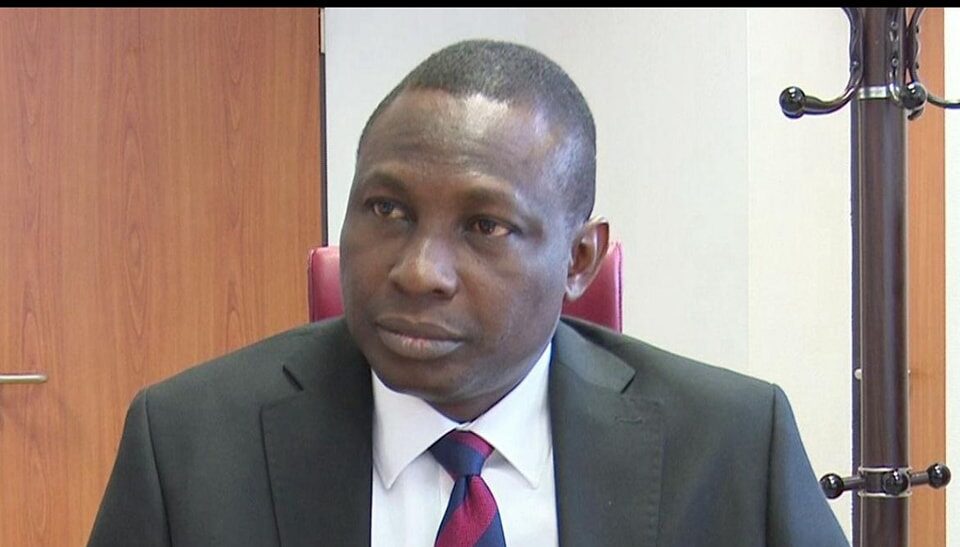Top Story
Ekiti gets NAF base, as Oyebanji, CAS turn sod at airport site
…Base’ll boost economy, tourism, security — Governor
Ekiti State Governor, Mr Biodun Oyebanji and the Chief of Air Staff, Air Marshal Oladayo Amao, on Thursday performed the ground-breaking ceremony for the construction of the Nigeria Air Force base at the Ekiti Agro Allied International Airport.
Speaking at the elaborate ceremony at the site of the base in in Igbemo, Ekiti Governor, Oyebanji said the project was aimed at developing a new frontier of economic activities, strengthening security architecture and tourism development in the state, adding that as a landlocked state, there is urgent need to open and connect the economy to the rest of the world.
While noting that the state is already driving towards establishing an aviation economy by taking advantage of its geography as a state and nearness to the political and commercial capitals of the nation, the Governor added that without aviation and security infrastructure, the state’s ambition to grow tourism infrastructure and prosperity agenda for the people would remain a mirage.
Governor Oyebanji posited that the turning of the sod was in fulfilment of the strategic vision of expanding security architecture and air military presence in the state, recalling that one of the reasons the state opted for the airport with the capacity to land any aircraft including military, was to ensure adequate and effective security of the people.
He stated further that the establishment of an Airport in the state was in fulfilment of the overall vision of his administration to make Ekiti the ultimate medical tourism destination in West Africa with the first class medical services being provided at Afe Babalola Multisystem Hospital and other tertiary medical facilities such as Ekiti State University Teaching Hospital, Ado-Ekiti and Federal Teaching Hospital, Ido-Ekiti.
While commending the contribution of the Chairman, Organizing Committee of the Airport Project, AVM Afolabi Ojuawo (rtd.), the Governor called on Ekiti indigenes at home and in the diaspora to emulate him by using their position to attract development to the state and boost its economy.
He solicited the support of the citizens of the state to cooperate with investors in the state to record seamless developmental programme as the state would continue to witness influx of investors who would need partnership as well as land.
Governor Oyebanji Commended the Chief of the Air Staff and the entire Air force for their laudable achievements assuring them of the unflinching support of the people and government of the state for the timely completion of the project.
“It will be recalled that one of the reasons we opted for this airport, which is situated on 4,072 hectares of land with the capacity to land any aircraft including military, is to secure our people.
“It, therefore, delights me greatly that today’s event is in fulfilment of our strategic vision of expanding security architecture and air military presence in our dear State. It will be recalled that one of the reasons we opted for this airport, which is situated on 4,072 hectares of land with the capacity to land any aircraft including military, is to secure our people.
“Let me reiterate the fact that the decision to have an airport in our State is primarily for economic, security and tourism development. As a landlocked state, we need to open and connect our economy to the rest of the world. As an agrarian economy, one of the ways to expand our economy is to find a way to connect our farm produce to the international market and to develop new frontiers of economic opportunities.
“Let me, therefore, use this medium to express my profound appreciation to the Chief of Air Staff, Air Marshal, Oludayo Amao for his commitment to the actualisation of the Air Force Operational Base in Ekiti and in particular for his promise to immediately activate the Air Defence project by establishing an Unmanned Aerial Vehicle (UAV) operational unit in Ekiti to cater for the air defence needs of the south western region of the country.
Earlier, the Chief of the Air Staff, Air Marshal Oladayo Amao said Nigerian Air Force had been employing airpower in support of the overall to tackle security situations such as terrorism, insurgency, armed banditry and kidnapping adding that part of the measures to urgently addressing the challenges was to establish new bases in strategic locations of which Ekiti was benefitting from.
AM Amao noted that the base would help the Air Force to effectively perform its security obligation in the state in particular and southwest in general.
While commending President Mohammadu Buhari for authorising the acquisition of modern and well-equipped platform to boost Nigerian Air Force air power employment and projection capabilities and air combat training, the Air force Chief stated that there would soon be deployment of Aircraft to Ekiti state to strengthen response to security challenges in the state and the southwest geo-political and to as well impact its readiness and responsiveness to security challenges facing the country.
In attendance at the event were members of the state executive councils, traditional rulers and Airforce officials.
Top Story
Hardship: FG kicks off N100bn consumer credit scheme


…Civil servants to benefit in first phase
By Grace Olatundun
The Federal Government of Nigeria has kicked off the N100 billion Consumer Credit Scheme for Nigerians as a tool to alleviate the escalating economic hardship in the country.
In a press statement on Wednesday by the President’s spokesperson, Ajuri Ngelale, he disclosed that interested Nigerians are expected to visit the portal of Nigerian Consumer Credit Corporation before May 15, 2024.
The President noted that the “consumer credit serves as the lifeblood of modern economies, enabling citizens to enhance their quality of life by accessing goods and services upfront, paying responsibly over time. It facilitates crucial purchases, such as homes, vehicles, education, and healthcare, which are essential for ongoing stability and the pursuit of their aspirations.
“Individuals build credit histories through responsible repayment, unlocking more opportunities for a better life. The increased demand for goods and services also stimulates local industry and job creation.”
The President stated further that every hardworking Nigerian should have access to social mobility, with consumer credit playing a pivotal role in achieving this vision.
“The Nigerian Consumer Credit Corporation (CREDICORP) achieves its mandate through the following: Strengthening Nigeria’s credit reporting systems and ensuring every economically active citizen has a dependable credit score. This score becomes personal equity they build, facilitating access to consumer credit, Offering credit guarantees and wholesale lending to financial institutions dedicated to broadening consumer credit access today and Promoting responsible consumer credit as a pathway to an improved quality of life, fostering a cultural shift towards growth and financial responsibility.
“In line with the President’s directive to expand consumer credit access to Nigerians, the Nigerian Consumer Credit Corporation (CREDICORP) has launched a portal for Nigerians to express interest in receiving consumer credit.
“This initiative, in collaboration with financial institutions and cooperatives nationwide, aims to broaden consumer credit availability.
“Working Nigerians interested in receiving consumer credit can visit www.credicorp.ng to express interest. The deadline is May 15, 2024.
“The scheme will be rolled out in phases, starting with members of the civil service and cascading to members of the public,” the statement read.
Recall that two months ago, a presidential spokesman, Bayo Onanuga, announced that the Federal Executive Council had given the nod for the establishment of the Consumer Credit Scheme.
He said the President’s Chief of Staff, Femi Gbajabiamila, will lead a committee that includes the Budget Minister, Attorney-General, and Coordinating Minister of the Economy and Finance to make the scheme a reality.
In March, the Chairman of the Federal Inland Revenue Service Chairman, Zacch Adedeji, said the Nigerian government would unveil its proposed N100 billion consumer credit loan in a few days.
Top Story
EFCC goes after PtoP operators, hands over 14 forfeited properties to Enugu Govt


The Economic and Financial Crimes Commission (EFCC) has commenced a clampdown on users of Peer to Peer platforms for foreign exchange transactions.
Speaking at a meeting with media executives in Abuja on Tuesday, Chairman of the EFCC, Mr Ola Olukoyede disclosed that the EFCC, in its bid to ensure the safety and stability of the foreign exchange market, has uncovered a new fraudulent scheme called P to P (peer to peer) trading scheme.
The platform, according to him, is operating outside the official banking and financial corridors with more than 300 (three hundred) accounts linked to it already frozen by the EFCC.
He reaffirmed the commitment of the Commission to the economic growth and development of the country, promising that the EFCC would not relent in the exercise of its mandate.
He also revealed that the Commission has recovered more than N120 billion from fraudsters within six months and secured more than 1300 convictions.
Meanwhile, the EFCC has also handed over 14 properties initially forfeited to the Federal government to the government of Enugu State.
The transfer of the properties to Enugu State governor, Dr Peter Mba was performed by the EFCC Chairman at the corporate headquarters of the Commission.
Speaking before the brief handover ceremony, Olukoyede who disclosed that the road to the forfeiture dated back to 2007, stated that event spoke of the mutually beneficial relationship existing between the federal government and states.
“What we are witnessing today testifies to a symbiotic relationship that should exist between the federal government and the state governments. The essence of our meeting here today is for us to handover properties that were forfeited to the federal government, which of course belong to Enugu State people back to the people. It shows that governance can work in Nigeria. Our people deserve the benefits of good governance and that is what is being evidenced here today.”
Speaking further, he said, “If you look at the history of this particular matter, it takes us back to 2007 when we started the prosecution. So we are looking at about 17 years since the matter has been on.
“Eventually some of the properties were forfeited and since then, the EFCC has been managing those properties even though the titles of quite a number of the properties have been revoked by the Enugu State government. What we are witnessing here today is the official handing over of the properties to the people of Enugu State through His Excellency, Dr Peter Mba,” Olukoyede said.
Earlier in his remarks, Governor Ubah expressed gratitude for the handover and thanked the EFCC chair and the Commission for ensuring that the people of his state reclaimed their common patrimony.
“I would like to express my profound gratitude for the event we are witnessing today. The importance and significance of this event can never be lost on us and we do not also take it for granted.
“So I want to take this opportunity to convey my profound gratitude and deep appreciation to the chairman and members of the EFCC team that have brought us to where we are today.
“This is a journey that began several years ago and we are marking a formal closure to that journey here today. A journey that saw the successful prosecution of certain companies in possession of assets belonging to the people of Enugu State.”
The Governor who noted that the properties were forfeited not to his state but to the federal government expressed gratitude to President Bola Tinubu for making it possible for them to be returned to the government and people of Enugu State.
“Those assets were forfeited to the federal government. And this brings me to another gratitude that I want to convey here today. I want to acknowledge and recognise the important role played by the President, His Excellency Bola Ahmed Tinubu.
“Without the proactiveness and speed at which he acted on our request to cede these assets back to the people and government of Enugu State, we wouldn’t have been here today. So I want to thank him most sincerely for granting our request for these assets that were forfeited to the federal government to be ceded back to Enugu State.”
He lauded Olukoyede’s initiatives at making the EFCC a strong institution and cautioned against attempts by some individuals to distract the Commission.
“I will not end this remark without acknowledging the work the EFCC chairman is doing in strengthening this very important institution. It is important that we do not weaken our institutions.
“Whatever we do in governance is transient. So I want to commend him for the efforts he is making in ensuring that this very important institution, the EFCC is strengthened. Thank you very much for all the great work you and your team are doing and particularly for the effort that you have put in to make today a reality,” the Governor stated.
The properties comprise houses, transmission equipment for radio and television stations, a building for medical operations, among others.
Top Story
MRS considers voluntary delisting from NGX, to hold EGM


The management of MRS Oil Nigeria Plc is considering voluntary delisting from the Nigerian Exchange.
The company has called for an Extraordinary General Meeting (EGM) to make the decisions on the share buyback and voluntary delisting.
The EGM is scheduled to hold at the Civic Centre, Ozumba Mbadiwe Avenue, Victoria Island, Lagos, on May 21, 2024, at 11:00 am according to a corporate disclosure made by the company.
The corporate disclosure reads that the company will meet to transact the following special business:
“To consider, and if thought fit, pass, with or without modification, the following sub-joined resolutions as special resolutions:
“That the voluntary delisting of all the Company’s issued shares from the daily official list of Nigerian Exchange Limited (the ‘Voluntary Delisting’) be and is hereby approved on such terms and conditions (including but not limited to the timing of implementation, arrangements for dissenting shareholders (if any) and the fulfilment of specific conditions precedent to effectiveness (if any), that the Board of Directors of the Company deems appropriate in connection with the Voluntary Delisting; and subject to obtaining all requisite regulatory approvals.
”That the Memorandum and Articles of Association (“MemArts”) of the Company be and are hereby amended to authorize the Company to undertake a share buyback and share capital reduction.
“That the Company be and is hereby authorised to undertake a share buyback and share capital reduction in connection with any of its issued shares that may be purchased from dissenting shareholders where necessary as a consequence of the Voluntary Delisting; on such terms and conditions, in such volumes and at such times as the Board deems fit; subject to, and in accordance with, applicable laws and regulations.
“That the company’s MemArts be amended upon completion of the share buyback and share capital reduction to reflect the updated share capital.
“That upon conclusion of the Voluntary Delisting, and whilst the Company remains a public limited liability company, the Board be and is hereby authorised to take all such action as may be required to admit the Company’s shares on the NASD OTC Securities Exchange to ensure that dealings in the Company’s shares are implemented in accordance with the Securities and Exchange Commission’s Rules on Trading in Unlisted Securities.
“That the Board be and is hereby authorised to take all such lawful actions and steps (including but not limited to entering into/executing such agreements and documents, appointing professional advisers and other parties, and complying with directives of any regulatory authority) deemed necessary to give full effect to the above-referenced resolutions.
“That the Company Secretary be and is hereby authorised to make all such filings, take all necessary lawful actions and/or steps to give effect to the above-referenced resolutions and comply with all relevant regulatory requirements.
“A member of the Company entitled to attend and vote at the EGM is entitled to appoint a proxy in his/her/its stead. A proxy need not be a member of the Company. It is important to ensure that all proxy documents are properly stamped by the Commissioner of Stamp Duties and deposited at the Registrar’s Office, First Registrars and Investor Services before the EGM commences.”
-
Finance3 months ago
Court orders Sen. Victor Umeh to repay N136m bank debt to AMCON
-



 Abuja Update2 months ago
Abuja Update2 months agoUNDP, FG partnership needed to achieve inclusion, equity- Minister
-
Abuja Update1 month ago
Banks drive stock market performance with N147bn gain
-



 Infotech4 weeks ago
Infotech4 weeks agoWorld Backup Day: NITDA urges Nigerians to ensure backup of data
-
capital market2 years ago
Rt.briscoe, FBNH, Others halts negative performance of stock market
-



 Health3 weeks ago
Health3 weeks agoImmunisation: FG, GAVI seek synergy with Sokoto Govt.
-



 Health1 week ago
Health1 week agoCapacity training will reduce migration of health workers- NPHCDA
-
Infotech2 weeks ago
Forex for Beginners: Unveiling the currency exchange and how to trade it
















